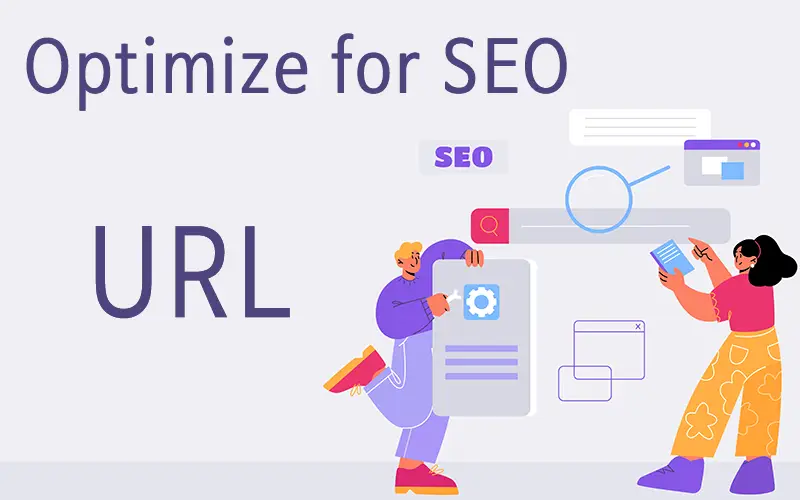When you think of SEO, targeted keywords are the first thing that comes to mind. But how much effort have you put into optimizing your URLs for SEO?
URL best practices can help drive traffic to your site by making it easier for search engines to find your content.
We'll explore the best ways to organize your URLs so that they appear higher in search engines, and why SEO-friendly URLs are important for your website.
What is a URL?
First, we need to make sure we understand what a URL is. A Uniform Resource Locator (URL), also known as a "web address," is the location of a resource (e.g., a web page, an image) on the Internet. A URL also describes how to retrieve that resource and is considered a "protocol," such as HTTP, HTTPS, FTP, etc.
A URL is human-readable text that is configured to replace a number (IP address) that allows a computer to communicate with a server.
Search engine optimization is very important and helps drive traffic to your website. You're probably already using SEO strategies for the web pages you have, but did you know that creating an SEO-friendly URL also helps?
"https://vivoldi.com/blog" This URL is made up of "protocol://domain name/path".
When creating a website, an SEO-friendly URL is essential to ensure that your pages are properly optimized for all search engines, including Google, so that your target audience can find your website.
Why should I use SEO-friendly URLs?
URL optimization is a technique for improving the URL structure of your website or blog pages to make them more accessible to users and search engine crawlers.
One of the first things search engines look at is your URL, which means it needs to describe what your website is about and be relevant to your business or blog.
For example, it doesn't make sense to have a domain that mentions basketball when you sell TV products. Search engines want your URL to be relevant and describe what your website is about. Remember, search engines place a lot of importance on providing users with the most relevant information.
Therefore, it's important to create an SEO-friendly URL and use keywords and phrases that are relevant and allow search engines to recognize your website.
It's a good idea to use keywords in your URL that are evocative of the title of your web page. When search engines understand what your web page is about, you can rank better, and users are more likely to learn more about your URL and get value from it.
We recommend keeping URLs as short as possible. As a website owner, you want to provide users with more keywords and more information, but it can get too complicated. Decide on a URL that is short and to the point. Avoid using unnecessary symbols or numbers, and make sure the keywords you use are in lowercase. This is because including lowercase and uppercase letters makes it harder to read.
Having a clear URL associated with your webpage makes your site more searchable and makes it easier for users to find the information they're looking for.
Think about it. If you were searching for the best laptops in 2023, which URL would you be more likely to click on?
https://yourdomain.com/278458912qsd339
https://yourdomain.com/best-laptops-2023
It's better if the URL contains the keywords you want to target, and you'll get more traffic to your website.
Tips for creating SEO-friendly URLs
We've compiled a number of SEO best practices to help you take your website to the next level. Read on to learn more and optimize your website today.

1. Make your URLs all lowercase
Mixing lowercase and uppercase letters in your URLs is not a major serviceability issue. Even so, it's better to standardize the look of your URLs.
(X) https://yourdomain.com/My-Best-Desktop-Pc
(O) https://yourdomain.com/my-best-desktop-pc
Lowercase is easier for users to read and is what users want. Standardizing your URLs will help prevent linking errors, whether internal or external.
2. Use hyphens instead of underscores
Always use a hyphen (-) rather than an underscore (_) because the underscore is not visible when the URL is published as a bare link. This means that when the link is inserted into a web page, the entire link text is underlined by the stylesheet, which can hide the underscore.
3. Avoid using unnecessary words in your URL structure
Sometimes people add the words "/category/" to their URL structure. This is an undesirable URL structure.
A URL structure like "/category/sound/headphones/" cannot be justified.
It should just be "/headphones/".
Similarly, if there's always a better word to tell users what to expect from a section of your site, use that word instead. Words are like navigation: they guide users to the content they're looking for.
4. Don't parameterize your URLs
If you can't read every word in a URL, neither can search engines. This is a big problem because search engines know that many people read URLs before clicking on them to understand the content of a web page. Search engines can't and shouldn't try to undo irrational, randomly generated URLs.
Instead, they read the words in a URL just as they would read the content on a web page. This allows them to better understand the content and connect with your target market.
Which URL would you click?
(X) https://yourdomain.com/index.php?product=518&model=iphone
(O) https://yourdomain.com/iphone-15-case
5. Top-level content in the root folder
Search engines also consider web pages in the root folder to be top-level content, and potentially better content, so you need to think very carefully and strategically about how you structure your URLs. The structure of a URL can indicate the importance of a page on your site.
(X) https://yourdomain.com/shop/pc/desktop/cpu/intel
(O) https://yourdomain.com/cpu-intel
6. Only one URL should exist on the homepage
Your homepage is usually the most important page on your site. Most websites have more inbound links than other pages, so it's likely to be the most influential page on your blog.
Unfortunately, many websites have a dozen different homepage URLs.
yourdomain.com/index.html
yourdomain.com/index
yourdomain.com/home.php
yourdomain.com/index_home
yourdomain.com/page/home.html
Perform the following tasks to resolve the issue
Choose one canonical URL for your homepage. 301 redirect to the canonical URL and avoid linking to other versions of the index page if you can.
7. Don't include dates in URLs
Including dates in your URL structure not only makes your URL longer, but it also hurts your SEO. SEO-friendly URLs should be shorter, better, and reusable from year to year.
For example, if you wrote a post about the best camcorders for YouTube creators in 2021, you wouldn't include "2021" in your URL. That said, you can update your post in 2022, 2023, etc. to keep your content fresh and still rank in search engines.
If you include the word "2021" in your URL, even if you update your content to the latest version in 2023, your click-through rate might drop because users will see it as outdated content written in 2021.
8. Use the HTTPS protocol
The HTTPS protocol is a more secure protocol compared to HTTP. It is essentially HTTP with a Secure Sockets Layer (SSL) added.
SSL encrypts your website to prevent hacking, so it's more reliable for users who don't expect to be hacked.
If your site only supports the HTTP protocol, most domain hosts should automatically redirect it to HTTPS. This will show a small padlock next to your URL, letting visitors know that it's a secure site.
9. Avoid using auto-generated URLs
When you first start writing a new blog post in WordPress, your URL is automatically generated.
It's usually a letter followed by random letters and numbers. Before you publish your post, it's a good idea to change the URL to match best practices in URL structure, or you risk Google not being able to figure out what your post is about.
Unfortunately, some website owners only care about the title and content of their posts and don't pay attention to the URL structure.
Creating SEO URLs with Vivoldi
When you create a short link in Vivoldi, it automatically generates a LinkID that is a mix of letters and numbers by default. So what can you do with it?
Utilize branded links. Branded links allow you to enter your own LinkID, which follows the best practices of a friendly SEO URL.
If you're serious about SEO and have some SEO expertise, we recommend using 301 redirects instead of 302 redirects.
Optimizing your URL for success may not be the key to top placement in search engines, but remember that creating a search engine friendly URL will give you a little edge over your competitors.
With Biboldi, you can easily turn your site into a search engine friendly site, including Google.
Create an account today and start using Biboldi to bring your website to the top.
The #1 shortened URL service. Vivoldi!
Thank you.



